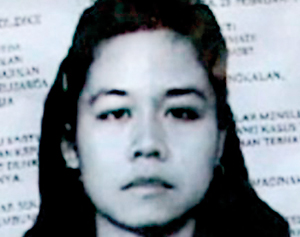Sunday Times 2
The maids on Saudi Arabia’s death row
View(s):By Alex Gore
Foreign workers are being warned of the ‘deadly risks’ they face in Saudi Arabia, with more than 45 maids awaiting execution despite growing anger at the country’s mistreatment of migrants. The death row prisoners include a domestic worker convicted of beating her employer to death when he allegedly tried to rape her.
Two wednesdays ago authorities in the Middle Eastern country ignored international pleas and beheaded maid Rizana Nafeek, 24, who was convicted of killing a baby despite protesting her innocence. Human rights groups believe Indonesians account for the majority of the maids on death row and that there are Sri Lankans, Filipinos, Indians and Ethiopians also facing execution.
Campaigners say many of Saudi Arabia’s 1.5 million migrant workers, around 375,000 of whom are Sri Lankan, are attracted to the country by the prospect of working for wealthy families but face exploitation and abuse.
This can range from months of hard work without pay to physical violence, in a country where legal protections are particularly weak, and access to lawyers, translators and embassies is often blocked.
Human Rights Watch’s Nisha Varia told The Observer: ‘The Saudi justice system is characterised by arbitrary arrests, unfair trials and harsh punishments. A domestic worker facing abuse or exploitation from her employer might run away and then be accused of theft.

Siti Zainab has been sentenced to death for stabbing her female employer to death in 1999
‘Employers may accuse domestic workers, especially those from Indonesia, of witchcraft. Victims of rape and sexual assault are at risk of being accused of adultery and fornication.’ Human rights group say 69 people were executed in Saudi Arabia last year and 79 the year before, including five women, one of whom was beheaded for witchcraft and sorcery.
Amnesty International Saudi Arabia researcher Dina el-Mamoun said there is growing alarm at the number of migrant workers being sentenced to death, with more than 120 foriegn nationals known to be on death row.
She said migrant workers in Saudi Arabia are at great risk if they end up in the criminal justice system and added countries should be advising their residents of the ‘very real and deadly’ risks. Ms Mamoun said: ‘In many cases they’re subjected to whole trials where they can’t understand the proceedings, which are conducted solely in Arabic, and without translation. They are often not given access to consular assistance.’ Death row prisoner Tuti Tursilawati binti Warjuki, 27, from Indonesia, faces execution for murdering her employer in 2010 when he allegedly attempted to rape her.
Her supporters say she was abused by the man since arriving in the country a year earlier and was denied legal representation for the first two months of her trial.
Siti Zainab, also from Indonesia, has also been sentenced to death after being convicted in 1999 of stabbing her female employer to death.
She confessed to the murder but the authorities appear to have dismissed concerns over her mental health.
Prisoner Satinah binti Jumadi Ahmad, 40, was arrested in 2007 for killing her female employer. The Indonesian government is prepared to pay some of the £1.6m blood money demanded by the woman’s family to save her.
Reports of what happened vary from her fighting back after being attacked to the maid having snapped after suffering months of abuse before being accused of stealing. The Sri Lankan government has spoken out against the execution of house maid Rizana Nafeek, from, Sri Lanka, after she was beheaded in public by a sword last week.
Miss Nafeek was sentenced to death in 2007 after her Saudi employer accused her of strangling his four-month-old baby two years earlier after a dispute with the child’s mother. Her family and human rights groups repeatedly appealed to King Abdullah to pardon Miss Nafeek, who protested her innocence and said the baby had choked to death while being bottle fed.
Supporters said the age on the passport she used to enter the country in 2005 was changed so she could get work and that according to her birth certificate she was just 17 when the baby died. Miss Nafeek said her original confession was made under duress and there translation services were not made available to her. Amnesty said she had no access to lawyers either during her pre-trial interrogation or at her 2007 trial.
Philip Luther, the organisation’s Middle East and North Africa programme director, said before the execution: ‘It appears that she was herself a child at the time and there are real concerns about the fairness of her trial.’
© Daily Mail, London
Follow @timesonlinelk
comments powered by Disqus















